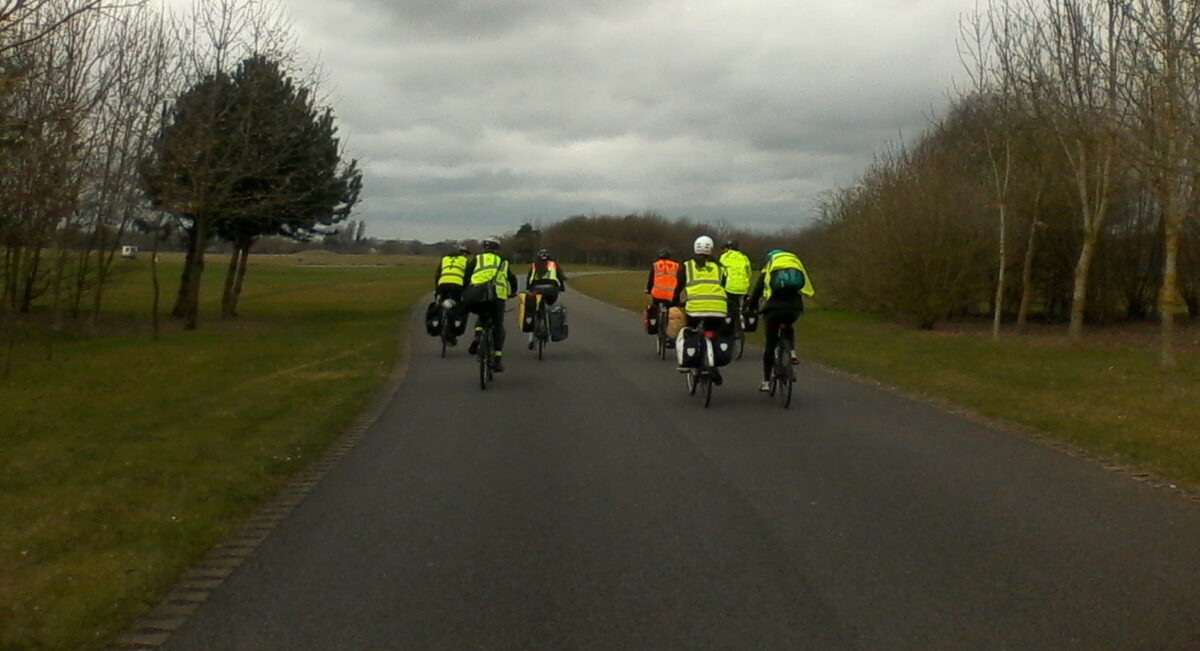Inspired by bicycle puns and a conviction that the UK should not have nuclear weapons, and should instead spend more money on welfare, education and sustainability, Owen Everett and a group of friends set up the cycling protest collective Wheel Stop Trident. He tells Lacuna about how it all started, the cycling so far, and what they’ve got planned next.
Lacuna: How did protest become such an important part of your life?
I got involved in activism when I was student at Warwick University between 2008 and 2012. Before university I’d been concerned about various issues, but had done nothing about them, beyond small gestures like recycling avidly to try and reduce my environmental impact. There was no culture of student activism at my school; I can only remember one person who spoke much about politics. I thought she was cool, and I agreed with what she said, but I was too focused on my studies, my extra-curricular activities and my socialising to match her.
There were two memorable experiences, which I think acted as stepping stones for my activism at Warwick. The first was how much I lamented missing the 2003 anti-Iraq war march because I was away on holiday with my family. The second was going on my first protest around three years later. It was an anti-nuclear weapons demonstration at Atomic Weapons Establishment Aldermaston. I went with a group of Quakers from my home town – my Mum brought me up as a Quaker, and Quakers have a long history of anti-nuclear weapons campaigning. It was very exciting to see lots of really passionate people, hear the speakers, and basically experience what I had before then only seen on TV. It made protesting feel a lot less daunting than it maybe did before.
I lamented missing the 2003 anti-Iraq war march
The difference between school and Warwick was that, going to a People & Planet society meeting early on in my first term, I suddenly felt surrounded by people my age who felt similarly compelled to try and protect the natural environment, stand up for equality in all its forms, and oppose war. I ended up spending a lot of my free time over the next four years planning actions, telling people about them, carrying them out, and then debriefing about them. Many of my best friends at Warwick were made this way.
Highlights included producing a guide for students attending a major university careers fair to help them make an informed decision about the companies who were present (our guide added nuance to the sanitised, glamorised self-image promoted by arms companies, fossil fuel companies, and others), and cycling to Copenhagen with two People & Planet society friends to document (and take part in) protests at the UN climate ‘Conference of Parties’ in 2009.
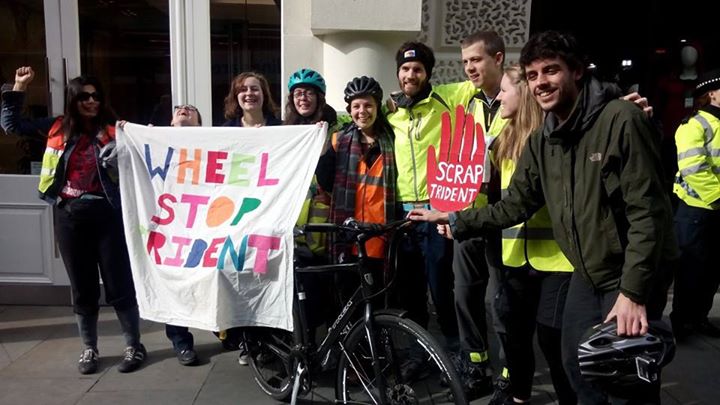
When I left Warwick in 2012, I moved to London where I got a job scrutinising the ethics of military ‘engagement’ with young people. The demands of long hours, and of endless social opportunities, meant that I had less time and energy for campaigning outside of work. But since August 2014 I’ve been working part-time, which has allowed me to reconnect with my activism in my free time. This has mainly been through Wheel Stop Trident.
Why did you choose to protest against the renewal of the UK’s Trident nuclear weapons system?
My group of like-minded friends (including one fellow Warwick alumnus) decided in January 2015 to make opposing the renewal of Trident our main activist project for the next couple of years essentially because we are convinced that nuclear weapons cannot bring real security, whereas spending that vast amount of money on welfare, education, and renewable energy can.
Spending Trident money on welfare, education, and renewable energy can bring real security
To attain genuine, long-term security for the UK – and the rest of the world – we have to tackle the most pressing threats to our society, which I believe are climate change, economic inequality, and terrorism. Nuclear weapons don’t work against any of these things.
Proponents of Trident claim that even if there are no threats from nuclear states to the UK – which is currently the only scenario in which the UK would use nuclear weapons – the future is unpredictable, and therefore Trident is the ‘ultimate security policy’, and getting rid of it would be ‘irresponsible’. They assert incessantly that Trident is a ‘deterrent’, but if this were truly the case, then surely every state should be allowed to develop them, rather than just the select few?
I often think that the most powerful argument against Trident is that the one country that has been attacked with nuclear weapons – Japan – chooses not to have them. If we were attacked with nuclear weapons, the deterrent would be proved futile, and there would be no point in retaliating: that would be mass murder, as it’s impossible to avoid mass casualties (including civilians) with these weapons. That’s my fundamental reason for opposing Trident – it’s completely immoral. The threat of using it, which we are doing by possessing it, is itself immoral. Instead of waiting for the unlikely possibility of nuclear attack, we should be doing our utmost to move towards a world where – thanks to genuine global security – such attacks will never happen.
‘Austerity’ cuts of recent years have seen the loss of day-to-day safety and wellbeing
Security is also the day-to-day safety and wellbeing of individual people. The ‘austerity’ cuts of recent years have seen many lose this, because the welfare and benefits systems they relied on have been hugely weakened. The latest figures indicate that Trident renewal will cost at least £205 billion over the lifetime of the new system. That’s so much money – money that could instead be invested in the common good – on welfare, education, and renewable energy – to make us more secure in the short and long term. I believe – and there’s quite a bit of evidence to back this up – that for some of the key proponents of Trident, it’s about trying to retain a world power status for the UK.
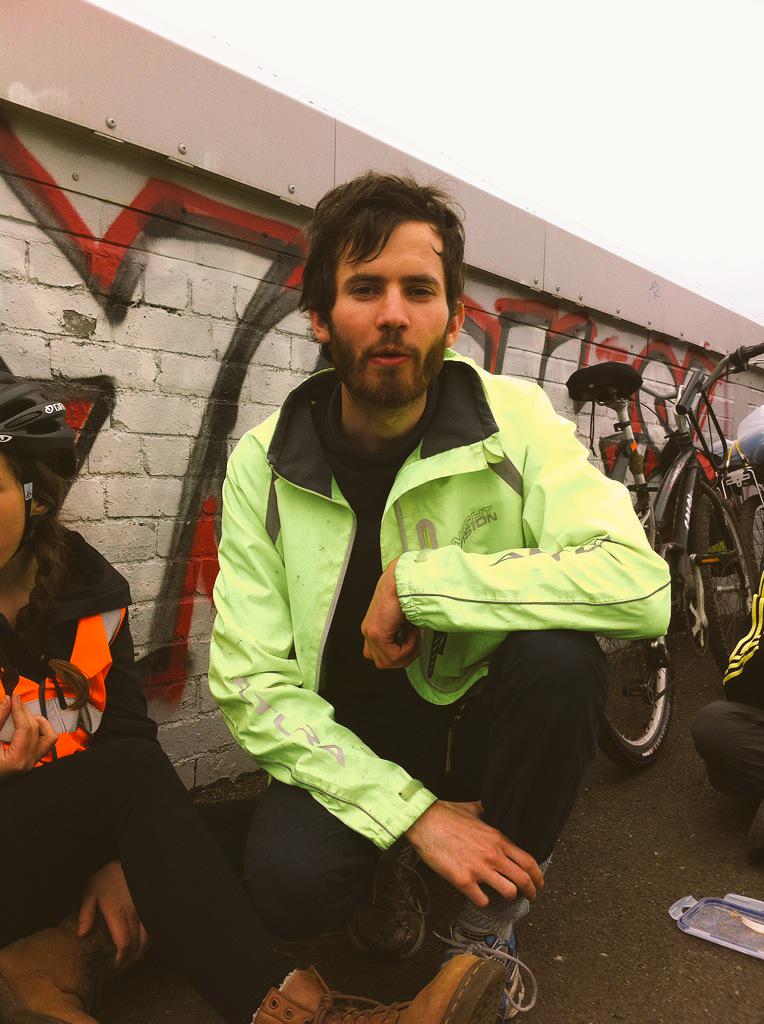
In addition, Trident is far from ‘independent’, and dangers of catastrophic accidents are very real: numerous near-misses and other safety concerns have been documented.
We know that government is going to decide sometime in 2016 whether or not to renew Trident. This represents a huge once-in-a-generation opportunity to try and influence the policy. We therefore agreed that we would focus our energies as a group on building the anti-Trident lobby, and our discussions turned to how to do this.
Why the bikes?
We became Wheel Stop Trident, as opposed to becoming an anti-Trident direct action affinity group, because we judged that we would have a greater impact by doing something distinctive.
Most of us are keen cyclists. In addition, bikes are symbolic of the world we want to move towards: one that is more sustainable, healthier, and therefore happier. It resonated with our reasons for opposing Trident and for supporting investment in what we feel is a truer, more holistic vision of security.
We were inspired by what we knew of cycling protest precedents. Many of us had been on critical mass bike rides – fascinating non-hierarchical events which have no stated purpose, but which for many people are about cyclists reclaiming the streets from the dominance of motorists. Indeed, we tried to recruit participants for our first Wheel Stop Trident action at one London critical mass, though unfortunately without a great deal of success! We wrongly assumed that because lots of people on the critical mass cared about space for cycling, and were a bit rebellious, that a lot would be anti-Trident, and keen on a more specific bike ride protest. But most were fairly apathetic, and a few were pro-Trident. So that reminded us that people’s political views can be mixed, and not necessarily predictable from issue to issue.
Cycling has also often been used in social and environmental campaigning. When I was in Copenhagen for the protests at the 2009 UN climate conference I saw the formation of a bike bloc of cycling protestors (including some impressive welding to create two-tier ‘double troubles’); they were sadly treated roughly by the police, despite being nonviolent themselves.
What is your approach in the cycle rides that you do?
We choose to make our bike rides go between locations related to Trident. By doing this, we are physically linking these sites – highlighting their role in creating and maintaining the weapons of mass destruction. In addition, the rides allow us to engage with a range of groups and individuals with similar aims (from anti-austerity campaigns to environmentalists) along the way, going to them to offer solidarity, and thus strengthening both of our movements by showing the inextricable connections between them.
Buildings related to Trident – such as the offices of private arms companies who receive huge government contracts to undertake aspects of the production and maintenance – are often indistinctive. They certainly don’t refer to their role in Trident and other arms production in their signage. We seek to increase transparency on what they do by protesting colourfully outside.
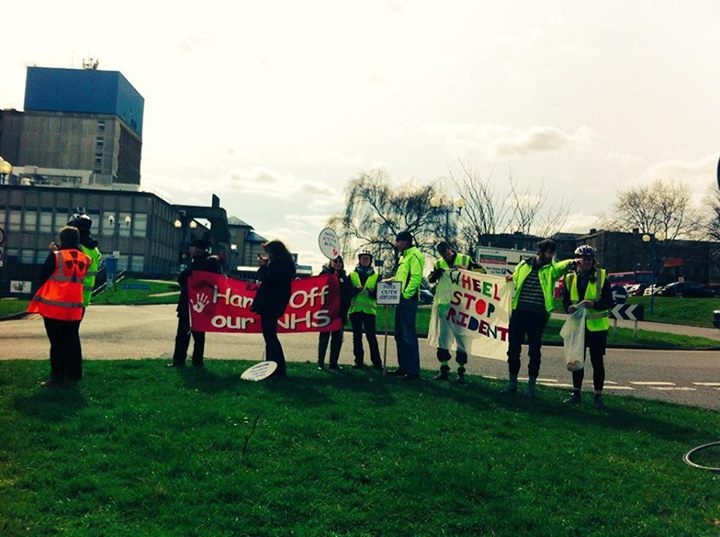
In all our cycle rides, there’s the element of fun. By showing our opposition to Trident – and our support for welfare, education and renewable energy systems – on our bikes, we are taking an engaging and disarming (so to speak) approach. We’re a bit different, and because of this, we’re more effective in getting attention for the issue. Just as an example, my non-activist friends have found it more interesting than other activism I’ve done. And we got a bit of national media coverage for our first action, which we probably wouldn’t have had if we’d gone for a more conventional blockade, say. Plus, as we get fit, rather than going slowly, and getting cold and a bit despondent – as often happens in our experience on marches and even during non-violent direct actions such as blockades – we feel good for it.
Our playfulness is evident in our frequent use of cycling puns, from our name Wheel Stop Trident to phrases such as: ‘Let’s brake the chains of nuclear weapons (but not our bike chains!)’; ‘bespoke cycling protest’, and ‘bring on the revolution’. We also often sing on our actions, putting campaign-relevant lyrics to well-known tunes. You can get a sense of this by watching the short animated promotional film that we produced before our first action (see below).
What cycle rides have you done so far?
Our first action was in March 2015, just a few months after we formed. Eight of us cycled from the London office of Lockheed Martin (the world’s largest arms company, which stands to profit massively if Trident is renewed), to Atomic Weapons Establishment Burghfield (where the warheads are produced and maintained), near Reading. Several other members supported us in social media and logistics roles. Along the way, we stopped off to show solidarity with six members of Ealing Save Our NHS, who were holding a rally in protest at the planned closure of much of their local hospital, and we visited the sustainability community Grow Heathrow to learn more about the links between environmental and peace concerns.
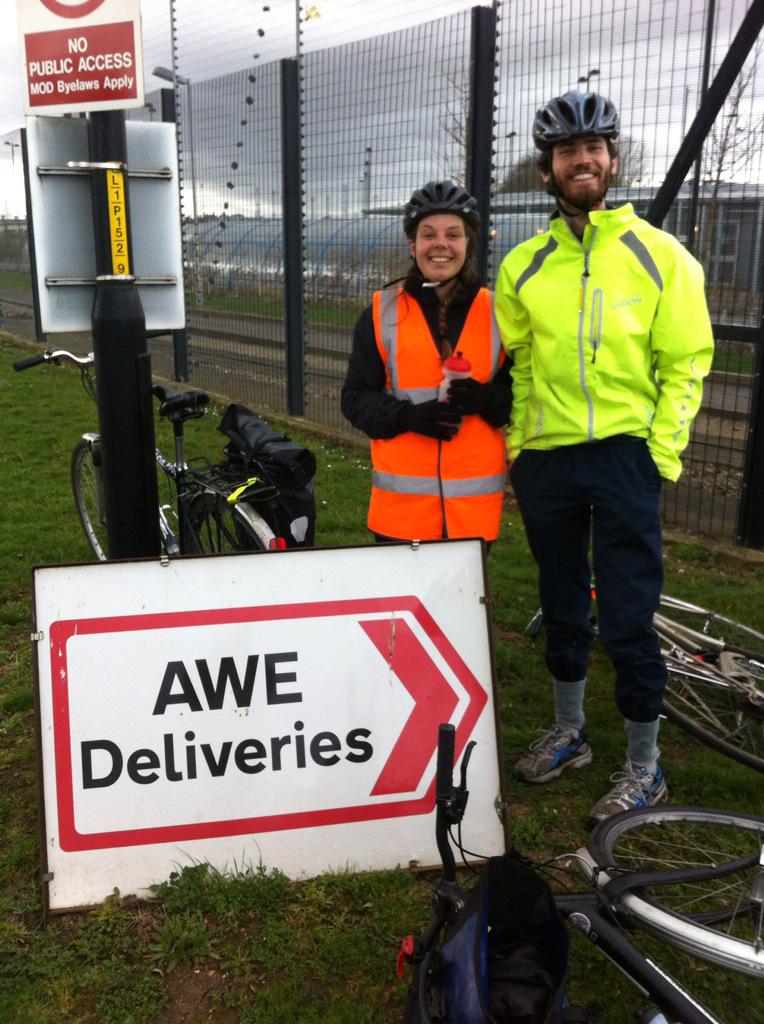
Burghfield.
As mentioned, this joining of the dots – both in terms of the stakeholders we are challenging, and potential allies – is integral to our actions. It was very nice to make allies en route, and feel part of a much broader, bigger movement. We made a short documentary of the bike ride, including interviews with some of the people we met on the way. In addition, one of the group – who is great with animation – produced a quirky promotional film to persuade others to get involved, which got quite a lot of interest on social media. All in all, the ride felt like a real success, in terms of our goals of raising awareness and forming links with related campaigns.
Inspired by our first action, we then did a pre-May 2015 general election ride between the London offices of Lockheed Martin and two other private companies who will get huge contracts if Trident is renewed, again linking up with some anti-austerity campaigners. We felt that returning to Lockheed Martin’s offices would help to increase the scrutiny on them, and that re-connecting with our friends from Ealing Save Our NHS (this time with them visiting us) would reinforce that fledgling alliance.
With the SNP, Green Party and Plaid Cymru open to entering a coalition with the Labour Party on the condition that Trident be scrapped, we saw this time as an important opportunity to raise the profile of the issue further. Sadly for us, that coalition was not to be. The ride went well; we had several new people there, and one of the Ealing Save Our NHS campaigners came to support us at one of the stop-offs, which meant a lot to us, as it showed that our gesture of solidarity in March was really worthwhile to both groups.
Since then we’ve done two smaller actions. In September 2015; we were part of the critical mass bike ride protesting against the world’s largest arms fair, DSEI, which is held at London’s ExCel Centre. We took part in this because arms companies involved in Trident renewal were present at the fair, and because it was an opportunity to recruit some new members. We had some encouraging conversations with the other cyclists, who took our leaflets with enthusiasm, and praised us on what we were doing.
Most recently, in February this year, we formed a bike bloc as part of the Stop Trident National Demonstration in London, which was the biggest anti-Trident march for a generation. Our promotion of the bike bloc on social media beforehand meant that some new people joined us. A family with buggies rather than bikes (as they couldn’t fit their bikes with trailers for the children on the train from Southampton) were going to join us too, as we are keen for any wheels to join us, not just bikes – especially on an action like this, where we went very slowly, and had to push our bikes for a lot of it. However, we unfortunately couldn’t find each other in the crowds!
With the strongly anti-Trident Jeremy Corbyn leading the Labour party (which is undergoing a Defence Review that may revise its currently pro-Trident stance), and the SNP unanimously against Trident, there’s an increased opportunity for the vote to go our way compared to before the 2015 general election.
There’s an increased opportunity for the vote on Trident to go our way in 2016
We don’t yet know when exactly the vote will take place, but it’s expected to be after the EU referendum. If MPs vote to renew Trident, we’ll keep protesting, because there would still be a chance to reverse that decision under a new government. We’ve discovered that cycling against Trident is an effective way to build the movement, both playfully, healthily, and in collaboration with other inspiring campaigns.
Our two plans for actions in the near future are another awareness-raising bike ride as part of the June month of protest at Atomic Weapons Establishment Burghfield, near Reading, and taking part in the mass lobby of MPs regarding Trident in July – organised by CND. We intend to do another bike tour of companies profiteering from Trident on the morning of the mass lobby, finishing at Parliament, as we think it is important both to shed light on their vested interested in Trident (otherwise, with nondescript offices on busy London streets, their involvement is almost invisible), and engage the general public outside of Westminster.
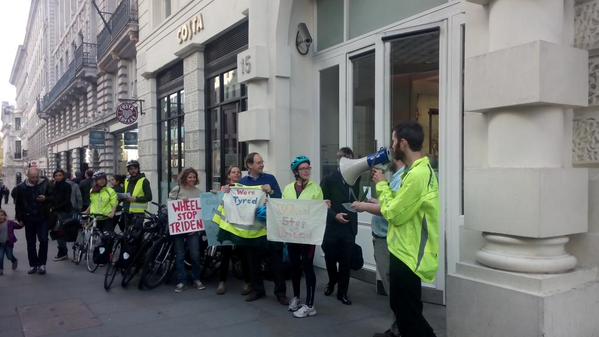
If Trident is renewed, in the longer term we’d like to do an epic relay cycle ride from Atomic Weapons Establishment Burghfield to Faslane nuclear submarine base in west Scotland, following a route similar to one that the Ministry of Defence trucks take when they transport the nuclear warheads from the factory to the submarines, and back for maintenance. We believe that the vast majority of people in the UK have no idea that this happens, and would be shocked if they knew that it was a necessary part of the UK’s possession of nuclear weapons. As the SNP argued in Parliament in January, the safety issues around the convoys are of huge concern. We would once more join up the dots on the map of institutions that uphold Trident, and of campaigns that oppose it in favour of a better world.
Get in touch if you’re interested in finding out more, or joining us on one of our upcoming actions! We’d love to hear from you.
All photos by Wheel Stop Trident.
